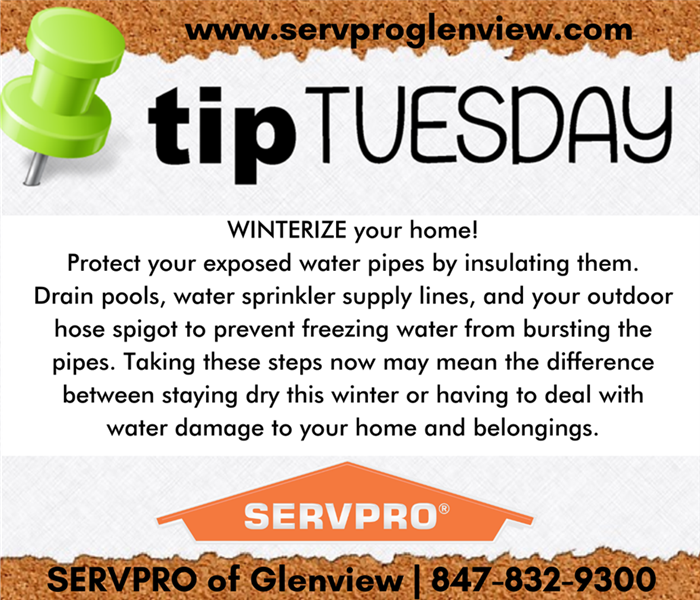Act Now to Prevent Pipes from Freezing This Winter
11/10/2020 (Permalink)
Each November, many Glenview-area residents can be found outside working around their homes. Reading this, what comes to mind for most folks is that homeowners are outside in November, either taking down Halloween decorations or putting up Christmas lights, inflatables, and other yard decorations.
While decorating your home for the holidays is a festive chore, Midwest homeowners should not overlook the regular home maintenance that should be done in order to winterize your home. Before the onset of the cold winter weather, be sure to protect your water pipes from freezing by taking the time to do these simple chores.
If you have an outdoor swimming pool, hot tub or jacuzzi, or have a lawn sprinkler system, be sure to drain water from your pool, tub, or sprinkler supply lines by following the manufacturer's or installer's directions. Do not put antifreeze in these lines unless specifically directed to do so. Not only is antifreeze environmentally harmful, it is dangerous to humans, pets, and landscaping. It is important to keep antifreeze out of our public sanitation and sewage lines.
While not every home will have a pool, but certainly most homes will have an outdoor water spigot and hose. To winterize your outdoor hose bib (spigot/faucet), close inside valves supplying the outdoor hose bib. Open the outside hose bib to allow water to drain. Remember to keep the outside valve open through the winter so that any water remaining in the pipe can expand without causing the pipe to break. Lastly, drain, remove, and store any hoses you've used outdoors by keeping them in a shed or garage. If you must store your hoses outdoors, be sure they are fully drained so the water does not freeze and expand and crack the hose over the winter.
Be sure to check around your home for other areas where supply lines by be located in unheated areas. Check areas such as your garage, attic, basement, and crawl space. Add insulation to these areas to help maintain higher temperatures which will help prevent freezing.
Look for areas where your water supply lines are exposed, such as under kitchen and bathroom cabinets, especially if the cabinets are located against an exterior wall. Both hot and cold water pipes in these areas should be insulated.
Consider installing specific products to insulate water pipes. Installing pipe sleeves, or UL-listed heat tape, heat cable, or similar materials on exposed water pipes can greatly reduce the likelihood of those pipes freezing and bursting.
If you are in an area that does not usually have frequent or prolonged temperatures below freezing, know that even a 1/4 inch of newspaper can provide some degree of insulation and significant protection to exposed pipes, if you are weighing your cost-to-benefit ratio.
If you have experienced freezing or burst pipes in the past, and protecting the exposed pipes has not proved to be effective, a more costly option, if possible, would be to relocate the exposed pipes to provide increased protection from heating.
Take preventative measures this month by doing regular home maintenance such as draining exterior water lines, or by insulating and protecting exposed pipes. When the frigid temps of winter come, you will rest easier knowing you have taken steps to prevent your pipes from freezing.
Should the unthinkable happen and your water pipes freeze and then burst, know you can count on SERVPRO of Glenview to respond to your call for help with the resulting water loss. Call us 24/7 at 847-832-9300. Whether your winter water damage is a result of a burst pipe, a frozen water dam in your gutters, or a failed appliance, our SERVPRO team of technicians are always Here to Help®.





 24/7 Emergency Service
24/7 Emergency Service
